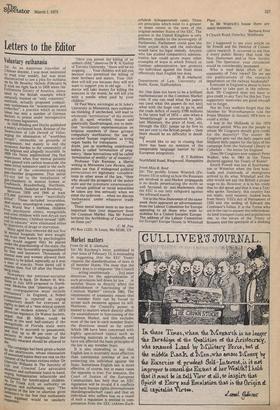Market matters
From Dr M. B. Ahehurst Sir: Mr Kitching's letter, published in your issue of February 15, is misleading in suggesting that the EEC Treaty requires the standardisation of laws in all member States. The most that the Treaty does is to empower "the Council . . . , acting unanimously. ... , [to] issue directives for the approximation of such provisions laid down by law ... in member States as directly affect the establishment or functioning of the Common Market" (Article 100). The requirement of unanimity means that no member State can be forced to accept such measures against its will. Moreover, the Council's power is limited to matters which directly affect the establishment or functioning of the Common Market, and this excludes most of the law in each member State; the directives issued so far under Article 100 have been concerned with highly specialised topics such as colouring materials in foodstuffs and have not affected the basic principles of the law in any member State.
It is also misleading to say that English law is invariably more effective than continental systems of law in protecting the individual against the State. Sometimes English law is more effective, of course, but in many cases the opposite is true. For instance, the Court of Justice of the European Communities has held that an EEC regulation will be invalid if it conflicts with basic human rights (Internationale Handelsgesellschaft case) and that an individual who suffers loss as a result
of such a regulation is entitled to compensation from the EEC (Ahtien-Zuck
erfahrik Schoppenstedt case). These are principles which exist to a greater or lesser extent in the laws ot the original member States of the EEC. The postion in the United Kingdom is very different; thanks to the sovereignty of Parliament, Parliament could pass the most unjust Acts and the individual would have no legal remedy. Anyone who has studied comparative administrative law could quote many other examples of ways in which French or German administrative law protects the individual against the State more effectively than English law does.
M. B. Ahehurst Department of Law. University of Keele, Keele, Staffordshire

































 Previous page
Previous page